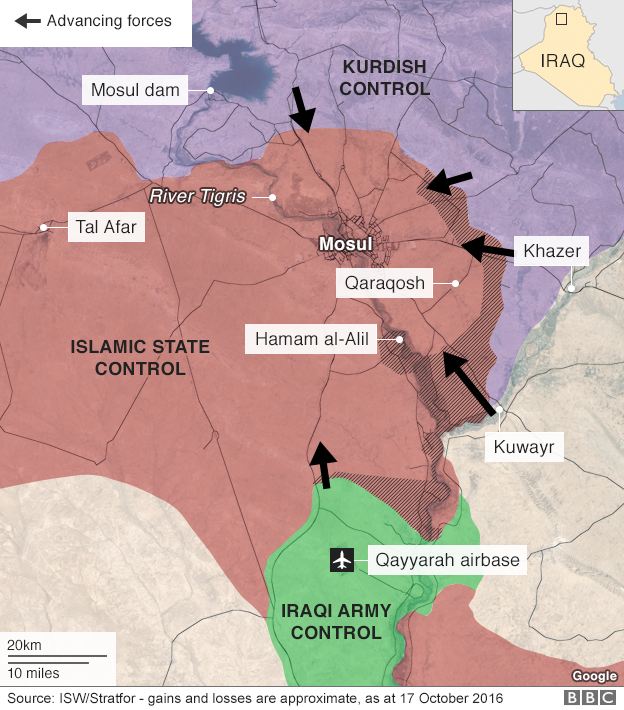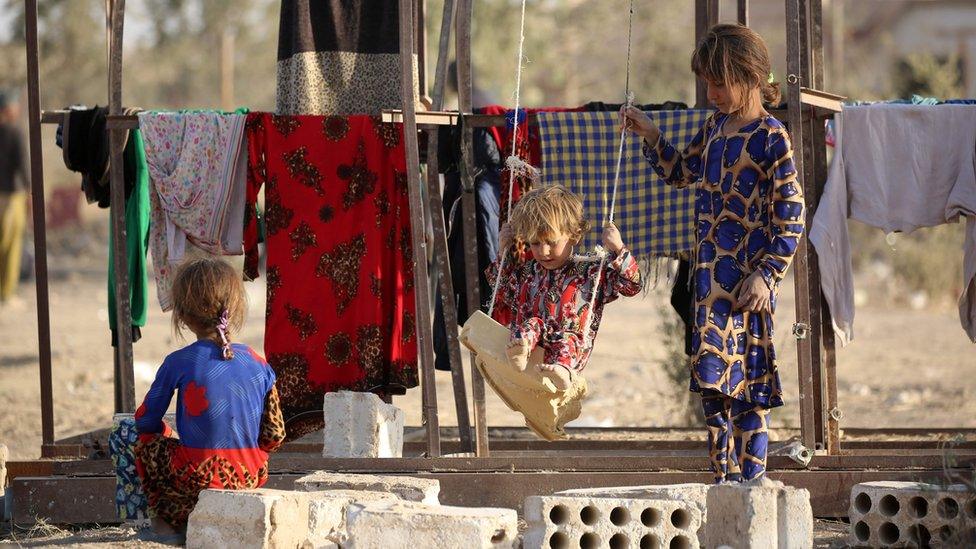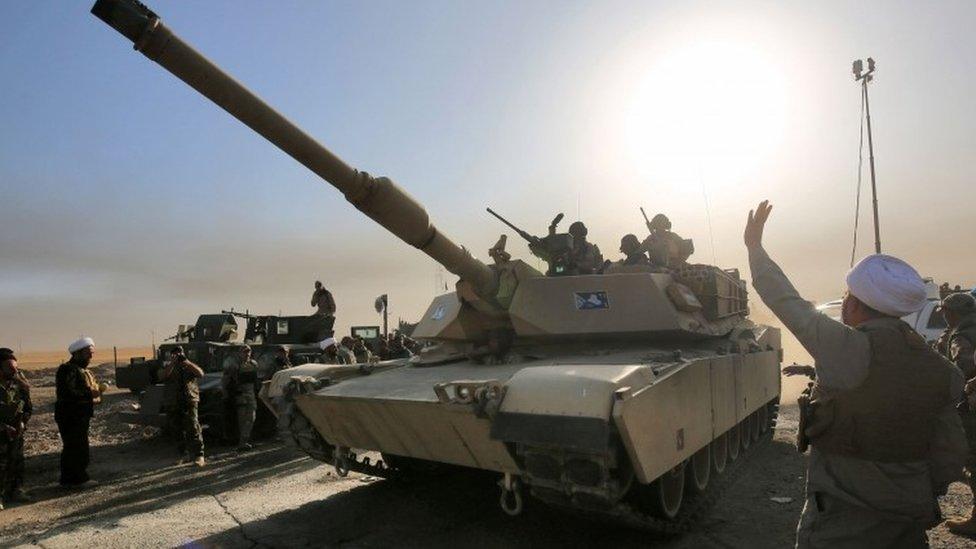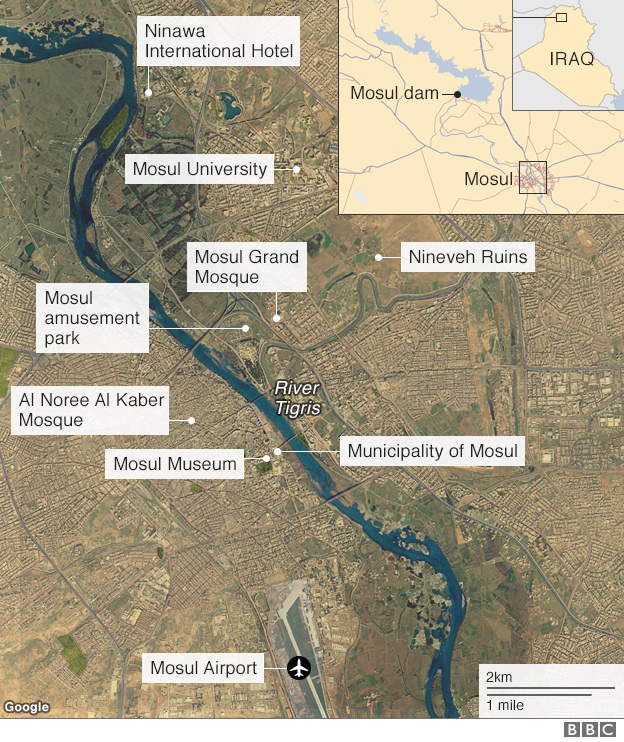Mosul battle: Iraqi troops 'ahead of schedule' in bid to retake city
- Published
Orla Guerin: "It could take months to drive the IS fighters from the city of Mosul"
Iraqi forces are "ahead of schedule", the Pentagon has said, as they begin the second day of the battle to retake Mosul from so-called Islamic State.
But spokesman Peter Cook warned that the campaign "could take some time" as it remained to be seen whether the jihadist group would "stand and fight".
Fighting continued overnight, with IS militants attacking Iraqi army tanks.
A BBC correspondent with an army unit says the southern frontline is still some 40km (24 miles) from the city.
IS militants overran Mosul in June 2014, before taking control of much of northern and western Iraq.
Their leader, Abu Bakr al-Baghdadi, chose a mosque in the city as the place to proclaim the establishment of a "caliphate", so retaking the city would be "symbolic", according to Mr Cook.
A coalition of about 30,000 Iraqi security personnel, Kurdish fighters, Sunni Arab tribesmen, and Shia paramilitary forces began their advance on the jihadists' last major urban stronghold in the country on Monday.
The Kurds seized several villages in the first few hours of the operation, and announced on Monday evening they had achieved all their key objectives, including recapturing 200 sq km and nine villages in under 24 hours.
They also secured an additional significant stretch of the road from the Kurdish city of Irbil to Mosul.

Mr Cook told reporters in Washington: "Early indications are that Iraqi forces have met their objectives so far, and that they are ahead of schedule for this first day.
"This is going according to the Iraqi plan - but again, it's early, and the enemy gets a vote here. We will see whether [IS] stands and fights."
The BBC's Jonathan Beale, who is with the Iraqi army south of Mosul, says troops are planning to push forward 4km (2.5 miles) on Tuesday.
They recaptured 10 villages on Monday, but have another 70 to retake before reaching the city's outskirts.
Defence correspondent Jonathan Beale is with Iraqi army forces on the road to Mosul
Our correspondent adds that they have been meeting some resistance, with rocket-fire killing a member of an Iraqi army tank crew overnight.
Kurdish forces were meanwhile holding their positions in the Khazer area, commander Col Kathar Sheikhan was quoted by the Associated Press news agency as saying.
Between 3,000 and 5,000 IS fighters remain in Mosul, the Pentagon estimates.
As the fighting gets closer to the city, concerns have been raised for the safety of civilians still trapped in the area.

The UN says up to 200,000 civilians may be displaced in the first weeks of the offensive
An Iraq-American journalist who has been on the outskirts of Mosul and has relatives in the city said telecommunications companies had restored mobile phone service there on Monday.
Steven Nabil told the BBC this was enabling residents to get the latest on the offensive, and also to provide invaluable intelligence to government forces on the locations of IS militants.
He said people there were feeling a mix of "excitement" at the prospect of liberation but also "stress and worry" about how IS would treat them and fear that they might get hit by an air strike or caught up in crossfire.
Mr Cook said he believed as many as 7 million leaflets would be dropped over Mosul since the weekend that explained to residents "the safest way to conduct themselves as this fighting plays out".

Who is fighting?
About 30,000 pro-government troops are involved in the operation. The main assault is being led by Iraqi army troops.
About 4,000 Kurdish fighters are trying to clear villages to the east of Mosul, to allow the army to move in.

The Iraqi army is moving on Mosul from the south
US Special Operations personnel are advising forces on the ground. Elite Iraqi counterterrorism forces are expected to join in the coming days.

Why Mosul matters
Mosul, the oil-rich capital of Nineveh province, is Iraq's second-largest city, and its capture by IS militants became a symbol of the group's rise as a major force and its ability to control territory.

The city was one of Iraq's most diverse, comprising ethnic Sunni Arabs, Kurds, Assyrians and Turkmens, as well as a variety of religious minorities.
While members of those minorities largely fled the onslaught by IS, many local Sunni Arabs initially welcomed the militants, angered by the sectarian policies of the previous Shia Arab-led central government.
But after two years of brutal IS rule, opposition has reportedly grown inside Mosul.
Caroline Hawley explains why the battle for Mosul matters so much
One major concern for those still there is the involvement of Shia militiamen in the offensive, after they were accused of sectarian abuses in other cities that have been recaptured.
Prime Minister Haider al-Abadi has sought to reassure them by saying only Iraqi security forces would be allowed to enter Mosul.
Even if IS is driven out of Mosul, the group will still control areas of northern and eastern Iraq.

What about the civilians in Mosul?
Mosul diary: 'I feel like I'm living in a prison'
Up to 100,000 Iraqi civilians may flee to Syria and Turkey to escape the military assault in Mosul, the UN says.
The UN High Commissioner for Refugees has issued an appeal, external for an additional $61m (£50m) to provide tents, camps, and winter items such as blankets for displaced people inside Iraq and the two neighbouring countries.
UN humanitarian chief Stephen O'Brien said: "I am extremely concerned for the safety of up to 1.5 million people living in Mosul who may be impacted."
Many are expected to be caught in the fighting. There are fears that residents could be used as human shields by IS.
As many as a million people could be forced to flee their homes.
Most are expected to leave "with only the clothes on their backs," Becky Bakr Abdulla of the Norwegian Refugee Council told the AFP news agency.